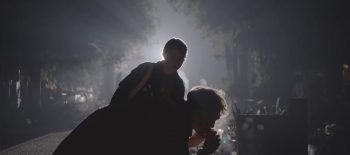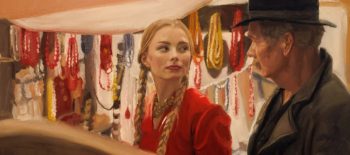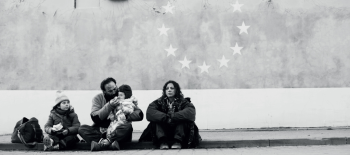The film Wałęsa. Man of Hope by Andrzej Wajda will be screened in the framework of a cooperation project between the Belgian and Polish partner towns Ruiselede and Kraśnik. Since the liberation of Ruiselede by troops from the First Polish Armoured Division, who fought alongside the allies in the Second World War, Ruiselede feels firmly connected to Poland. This connection has been strengthened by a youth exchange programme. Last year, we celebrated the 70th anniversary of the liberation with the Polish Days in Flanders.
PRACTICAL INFORMATION
>>> Zaal voor Sport en Spel (Tieltstraat 46, 8755 Ruiselede) – see map
>>> Monday 3 August 2015 at 20:30
>>> Free entrance
+++ Read more about the film
+++ Read more about the life of Lech Wałęsa
+++ Read more about the director Andrzej Wajda and the script writer Janusz Głowacki
SYNOPSIS
The New Europe has its beginnings in Gdansk! “Wałęsa. Man of Hope” is a story of a contemporary hero – Lech Wałęsa (Robert Więckiewicz). The movie begins with Oriana Fallaci (Maria Rosaria Omaggio) appearing at the Wałęsas’ flat in an apartment block to interview the future Nobel Prize winner. The emotion-packed conversation with one of the world most famous journalists constitutes a fabric of the movie narrative. Fallaci poses questions no one else ever wanted or dared to ask the legendary leader of the ”Solidarity” movement. By doing so, she unveils the truth of a man gifted with charisma and amazing political intuition.
The actual biographical story begins in 1970: Soon after the communist authorities have bloodily suppressed the workers’ protests, Wałęsa is forced to sign an obligation to collaborate with the Security Services. The following scenes showing hero’s path to political maturity are interwoven with the Wałęsas’ family life. The relationship between Lech and Danuta (Agnieszka Grochowska), their house full of kids and daily problems are as important as politics – they thought they were to live regular lives in their Gdansk apartment, but instead they were surrounded by momentous, political events, calling for taking a stand. Behind the strong man there is – as it turns out – a much stronger woman, his wife.
Sometimes freedom needs to be fought for and your homeland needs to be protected. Politics and love, fear and sense of security, necessity of subordination and a will to rebel – the film, just as Lech Wałęsa’s life, is full of contrast. His sense of duty towards the nation intertwines with that towards the family; the love of his wife and children with the love of his country. Is Lech making the right choices? What is the price he needs to pay?
director – Andrzej Wajda
scenario – Janusz Głowacki
music – Paweł Mykietyn
CASTING:
Lech Wałęsa – Robert Więckiewicz
Danuta Wałęsa – Agnieszka Grochowska
Nawiślak – Zbigniew Zamachowski
Majchrzak – Cezary Kosiński
Oriana Fallaci – Maria Rosaria Omaggio
Director of the shipyard (1980) – Mirosław Baka
Priest – Maciej Stuhr
Production: akson studio
Co-production: Orange, TVP – Telewizja Polska s.a., NCK – National Center for Culture, Canal Co-financing: Polish Film Institute
TRAILER
LECH WAŁĘSA
Lech Wałęsa, was born on September 29, 1943 in Popowo (Poland). Co-founder and a first leader of the Solidarity (“Solidarność”) trade union movement. In August 1980 he led the Gdansk shipyard strike. As a result of the strike, the communist authorities capitulated and agreed to sign Gdansk Agreement (August 31, 1980). He was fighting for a right of a working people to associate and for the dignity of human labour. During the martial law, which was introduced in December 1981, he was interned and isolated.
Lech Wałęsa, a charismatic leader of the Polish opposition, has eight children with his beloved wife Danuta (married in 1969). When he received the Nobel Peace Prize in 1983, it was she, who went to Oslo and read the acceptance speech: We desire peace – and that is why we have never resorted to physical force. We crave for justice – and that is why we are so persistent in the struggle for our rights. We seek freedom of convictions – and that is why we have never attempted to enslave man’s conscience nor shall we ever attempt to do so. During the following transformation process, he played a key role in talks between the communist party and the opposition. Wałęsa was elected as the President of Poland in 1990.
1970
In December 1970 Lech Wałęsa is one of the leaders of the Gdańsk Shipyard strike and becomes a member of the Strike Committee.
1978
In 1978 he starts collaboration with the Free Trade Unions of the Coast and distributes opposition’s press. He then becomes a co-worker of the Workers’ Defence Committee and joins the editorial staff of the independent biweekly “Robotnik Wybrzeża” (“Worker of the Coast”).
1980
In August 1980 he is one of the organizers, alongside e.g. Bogdan Borusewicz of the Gdańsk Shipyard strike and becomes its leader. After other protesting groups join in, he proclaims it a “solidarity strike.”
1981
December 13th, 1981 he is detained, transferred to Warsaw, then interned in government facilities in Chylice, Otwock Wielki and, finally, in Arłamów. When the decision of his internment is overturned in November 1982, Lech Wałęsa goes back to Gdańsk, where he is welcomed by crowds of people.
1983
On October 5th 1983, the Norwegian Nobel Committee announces its decision to award Lech Wałęsa with the Nobel Peace Prize. His wife, Danuta Wałęsa, collects the prize on his behalf.
1989
During the Roundtable Talks in Warsaw Wałęsa is a head of the “Solidarity” delegation. He also participates in confidential meetings at the Ministry of the Interior Affairs facility in Magdalenka, which are decisive in concluding the agreement. As a result, parliamentary elections are held in June 1989.
1990
After two rounds of elections in November and December of 1990, he is elected President of the Republic of Poland. On December 22nd he is sworn in as the first president elected in the popular elections. Wałęsa remains in office until December 22nd, 1995. During his time in office the Soviet Army leaves the Polish territory.
Andrzej WAJDA
Film and theatrical director; born March 6th 1926 in Suwałki, Poland; Education: Academy of Fine Arts, Krakow; Film School Łódź; Film Director 1954; Theater Dir. Teatr Stary, Cracow 1962-1998; Man. Dir. Teatr Powszechny Warsaw 1989-90; Hon. mem. Union Polish Artist and Designers (ZPAP) 1977; President Polish Film Assoc. 1978-83; ”Solidarity” Lech Wałęsa Council 1981-89; Senator of the Republic of Poland 1989-91; Presidential Council for Culture 1992-94; Founder: Center of Japanese Art and Technology, Krakow 1994;
Dr. h. c.: American University Washington 1981; University Bologna 1988; Jagiellonian University Krakow 1989; University Lyon 1995; University Libre Bruxelle 1995; Gdańsk University 2004; University of Warsaw 2005; Membre Institut de France 1997;
Prizes:
– State First Class Prize 1974;
– Order of the Banner of Labor (second class) 1975;
– Konrad Swinarski Prize 1976;
– Premio David di Donatello Luchino Visconti, Italy 1978;
– Officer’s Cross of Order of Polonia Restituta;
– Order of Kirill and Methodus (first class), Bulgaria 1978;
– BAFTA Fellowship 1982;
– Onassis Prize, Greece 1982;
– Oficier, Legion d`honneur 1982 France;
– Cesar Award, France 1983;
– Pirandello Artistic Award, Italy 1986;
– Kyoto Prize, Japan 1987;
– Felix European Film Awards – Lifetime Achievement Award 1990;
– Order of Rising Sun, Japan 1995; Premium Imperiale, Japan 1997;
– Golden Lion Life Achievement Award, Venice, 1998;
– OSCAR® American Film Academy – Lifetime Achievement Award 2000;
– Commandeur, Legion d`honneur France 2001;
– Golden Bear Life Achievement Award, IFF Berlin 2006;
– European Film Award Prix FIPRESCI 2009.
Janusz GŁOWACKI
Born September 13th, 1938, a writer, a playwright and a scriptwriter of, among others: Hunting Flies by Andrzej Wajda, We Have to Kill This Love by Janusz Morgenstern or A Trip Down the River by Marek Piwowski. In August 1980, during the strike, he came to the Gdańsk Shipyard, and soon afterwards he wrote a book Moc truchleje / Give Us This Day, based on the events he witnessed, showing the strike through eyes of a simple worker. The novel was withheld by the censorship, but came out in the underground in 1981 and later in Europe and America. It was acclaimed as “the best report on the Polish August.” His theatre plays: Cinders, Fortinbras Gets Drunk, Hunting Cockroaches, Antigone in New York, and The Fourth Sister, were staged by the major world scenes, a.o. the Royal Court Theatre in London, Manhattan Theatre Club, Public Theatre and Roundabout Theatre in NY, the National Theatre in Taipei, theaters in Belgrade, Frankfurt, Seoul, Buenos Aires, Moscow, St. Petersburg, Sarayevo, London, Los Angeles, Yale Repertory, Atlanta, New York (Vineyard Theatre), Mexico City, Croatia, Lithuania, Paris, Sydney, Toronto, Marseilles, Lyon, Geneva, Brussels, and many others, and brought him numerous prestigious awards, a.o. the Moliere Award for the Best Production of 1986, the Joseph Kesselring Award 1987, the Hollywood Drama League Critics Award 1987, Le Balladine Award for the Best Play of 1997, and the Grand Prize at the 2001 International Theatre Festival in Dubrovnik.



